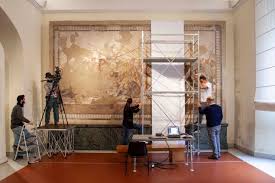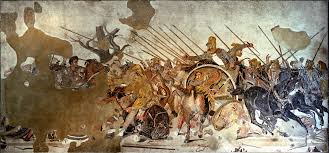Italy: Pompeii’s Alexander Mosaic to be restored

Naples: Pompeii’s celebrated mosaic of Alexander the Great’s victory over King Darius III of Persia is to undergo a major restoration project at the National Archaeological Museum of Naples (MANN).
The restoration of the monumental mosaic, which was rediscovered at the House of the Faun in Pompeii in 1831, will begin at the end of this month and is expected to be complete by July.

Dating from circa 100 BC, the floor mosaic is traditionally believed to depict the Battle of Issus in southern Anatolia, on 5 November 333 BC, the second great battle of Alexander’s conquest of Asia.
The mosaic measures 5.82 by 3.13 metres and is one of the most celebrated works to be found at the ancient Roman city, which was buried in volcanic ash and pumice after the eruption of Mount Vesuvius in 79 AD.
The upcoming restoration, described as an “ambitious and complex operation” by MANN director Paolo Giulierini, will take place after “meticulous preparatory work.”

Giulierini says the project will make use of advanced digital technology “allowing for the delicate operations to be followed, step by step, in a sort of ‘transparent construction site’, as has never happened before.”
The project, which has received a “significant technological contribution” from Italian telecommunications company TIM, is being overseen by Italy’s Central Restoration Institute (ICR) in collaboration with the University of Molise UNIMOL and the Center for Research on Archaeometry and Conservation Science (CRACS).
When it was unearthed in 1831, the mosaic was found to be in a good state of conservation, and there was much debate over the need to move it to the Royal Bourbon Museum in Naples (now MANN).
However, after about 12 years, a commission agreed that it should be moved and the masterpiece was detached on 16 November 1844 and transported to Naples on a cart pulled by oxen.
However, in an accident during the journey, at Torre del Greco, the mosaic was thrown to the ground. The box containing the masterpiece was not opened until January 1845 and, to the relief of all, the mosaic did not show any signs of damage.
Initially the mosaic was placed on the floor of the museum but was moved to its current wall position in 1916. The surface of the masterpiece is now suffering from swellings and depressions, which the museum believes is likely the result of oxidation caused by metal elements in the timber framework put in place in 1916.
There are also vertical and horizontal microcracks and damage to the mortar holding together the estimated one and a half million tiny coloured tiles called tesserae.
The museum says that this phenomena is aggravated by the weight of the mosaic and its vertical position, both of which can be attributed to causing the mortar and tesserae to slide downwards.
Hailing it as a “grand restoration,” Giulierini said: “We are writing together an important page in MANN’s history of the National Archaeological Museum of Naples and the conservation of cultural heritage.”





